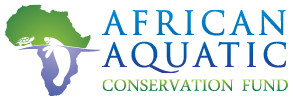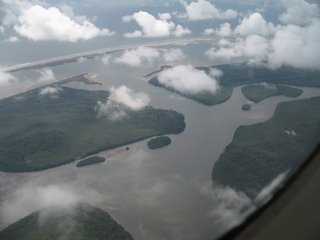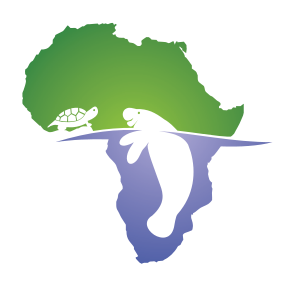View of Fernan Vaz Lagoon as I flew to Iguela on Friday. The Atlantic Ocean is at the top of the picture on the far side of the slender peninsula. I also saw a group of humpback whales from the plane!
Iguela
Last Friday I flew from Libreville to Port Gentil and on to Iguela, which sits on Ngowe Lagoon about halfway down the coast of Gabon. It is also the site of Loango National Park, which you might’ve read about in National Geographic when Mike Fay did his Mega-transect walk across Africa a few years ago. This is where he came out on the coast and saw the hippos surfing in the ocean. I actually flew to the town of Ombooue, and from there we were picked up by a truck which drove us an hour an a half south across the savanna to Iguela. It’s a bumpy ride but you sit on these comfortable benches on the bed of the truck with a cover overhead and what amounts to rollbars along the sides, so it’s as comfortable as you can be while sliding up and down on sandy paths.
Loango Lodge is gorgeous and sits on a narrow part of the northern end of the lagoon. There are about 20 guest cabins, a main building with a library, bar, dining room and deck overlooking the water, a gazebo out over the lagoon and park offices. Guests come here to see the wildlife and fish. There are also staff and scientist quarters, so the whole place amounts to a village of about 60 people. The lodge is owned by a Dutchman named Rombout Swanborn, and his company, SCD, is a partner in Operation Loango, a joint venture initiative that comprises SCD (Société de Conservation et de Dévelopment), Wilidlife Conservation Society and the Gabonese National Parks Authority. The park is run by Gabon’s Ministry of Water and Forests with technical assistance from Wildlife Conservation Society. Tomo Nishihara is in charge of WCS’s program here. Scientists come here to study the plants, crocodiles, whales and now manatees! I was invited here by Tomo and Mr. Swanborn to assess the lagoon’s manatee population. Over the past few years Tim, Nic and others here have had quite a few manatee sightings, including a mating herd of 16 animals on one occasion. It could be another good location to do some satellite tagging in the future. There is still hunting here- the park staff (EcoGuides) have confiscated 5 manatee nets and also rescued and released a live juvenile manatee caught in a net.
Two EcoGuides have been assigned to work with me on the lagoon. Pierre is a former manatee hunter who now works for the park (former hunters make great park rangers because they know the area and how the poachers think, where to find all the animals, etc. And they make a living from protecting the wildlife instead of killing it). My other guide is Brice, he speaks alittle English which is helpful. My French is getting better since most people here don’t speak English, but I still think I need to buy some French language tapes when I get home since most of my vocabulary revolves around boats, plants, manatees and food (because you all know how important food is to me!).
On my first morning on the water on Saturday, we saw 3 manatees in 3 different locations, which was exciting. I now understand why there are almost no photos of West African manatees- you see them as they swirl away and that’s it. We also saw hippos, and a snake swimming across the lagoon. After I initially do some larger surveys of the lagoon, I’ll likely focus on 3 areas where manatees are most frequently seen: the northern corner of the lagoon (appropriately nicknamed Manatee Corner) and 2 rivers off the lagoon. Since the lagoon is over 20km long, the plan is to spend a few nights camping at each of these spots.




No Comments